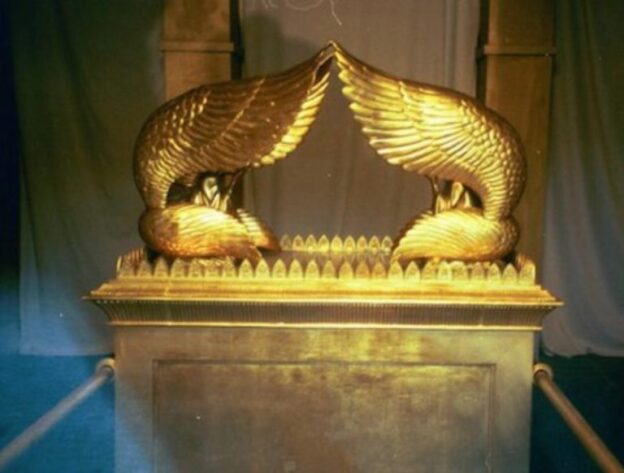An essay making the case for maintaining traditional standards at the Kotel is at Religion News Service and can be read here.


An essay making the case for maintaining traditional standards at the Kotel is at Religion News Service and can be read here.

Describing our ancestors’ worshipping of the egel hazahav, the golden calf, the Torah relates that “Early next day, the people offered up olos [burnt offerings] and shelamim [peace sacrifices], they sat down to eat and drink, and then arose litzachek [to enjoy themselves]” (Shemos 32:6).
The legendary Novardhoker Maggid, Rav Yaakov Galinsky, zt”l, would comment in the name of an “early master” that the order of the happenings in that pasuk is significant, andhas broad historical pertinence.
The egel hazahav, he explained, was the first veering of the Jewish people away from Hashem, the first Jewish pursuit of a foreign-to-Torah ideal, one that bordered on idolatry. But it is an unfortunate prototype for other such ideal-idolatries in subsequent times.
Many a social movement has been birthed or eagerly embraced by Jews. And each began with with a lofty ideal, a figurative olah, a sacrifice entirely consumed on the altar, signifying selfless devotion.
With the passage of time, though, the heady days of every “ism”’s youth give way to a more jaded, or at least “realistic,” approach, signified by shelamim, a sacrifice where the supplicant is able to enjoy some of the meat. The high ideal, of course, is still heralded as paramount, the flag of altruism still flies, but there is an expectation of some “return on the investment” in the cause.
And then come the final stages, when the loftiness of the movement’s revolutionary goal deteriorates into “eating and drinking” – where self-interest and a “what’s in it for me?” mentality reigns — and, ultimately, into a litzachek frame of mind, when materialism and lust become the society’s entire foci.
The golden calf was the first worshipped ism, but it was far from the last.
© 2026 Rabbi Avi Shafran

I had to do a double take after reading that a group of 151 former ministers, ambassadors, and diplomats accused the French foreign minister, Jean-Noël Barrot, of spreading disinformation about United Nations Special Rapporteur for Palestine Francesca Albanese.
Monsieur Barrot’s alleged misstep was his reaction to Signora Albanese’s comments on February 7, 2026 at an Al Jazeera forum in Doha, Qatar, on a panel devoted to “the Palestinian cause.”
True to loathsome form and to the great pleasure of her audience, the signora, like others on the panel, including a Hamas leader and an Iranian minister, railed against Israel.
Ho hum.
She accused the Western world of amplifying a “pro-apartheid genocidal narrative” and bemoaned the challenges that the “global community” faces today.
And she concluded that “We who do not control large amounts of financial capitals, algorithms, and weapons, we now see that we as a humanity have a common enemy [italics mine].”
Monsieur Barrot called Signora Albanese’s remarks “outrageous and reprehensible.” Italian Foreign Minister Antonio Tajani said her “behavior, statements and initiatives aren’t appropriate for the position she holds,” and Germany’s foreign minister, Johann Wadephul, said the lady’s position is “no longer tenable.” France, Austria, the Czech Republic, and the United Kingdom have also called for the special rapporteur’s dismissal.
Even U.N. Secretary-General António Guterres, not known for empathy for Israel, said (through a spokesperson; he may have feared choking on the words) that “We don’t agree with much of what [Albanese] says, and wouldn’t have used the language that she’s using in describing the situation.”
Thus my need to reread, with incredulity, the 151 former ministers’, ambassadors’, and diplomats’ and entertainers’ (always experts on foreign affairs) rush to the defense of the special rapporteur, claiming that the media had truncated and distorted her comments.
In an open letter, the group accused Monsieur Barrot of spreading inaccurate and manipulated information, and condemned its use to discredit the UN official.
“The dissemination of disinformation by senior officials,” they wrote, “undermines international law, weakens human rights protections, and threatens the credibility of the multilateral system itself.”
Signora Albanese herself fumed that “European governments accuse me – based on statements I never made – with a virulence and conviction that they have NEVER used against those who have slaughtered 20,000+ children in 858 days” – tellingly citing the Hamas-run Gaza health ministry’s death toll claim.
So how did the signora defend her words? She contended that what she had meant by humanity’s “common enemy” was not – G-d forbid! – Israel (the topic of her rant), but rather “THE SYSTEM [caps hers] that has enabled the genocide in Palestine.”
Oh.
Even in her attempt to “explain” her words, the signora felt it important to use the disgustingly deceitful word “genocide” for Israel’s war against Hamas. Hardly surprising, considering that, during the October 7 pogrom, she urged that the murdering of innocents be placed in its “context.” And that she dismissed reported acts of the invaders’ viciousness documented by U.N Watch and the ADL as “fabrications.”
With that background, and in a speech that was devoted entirely to besmirching Israel, the special rapporteur’s claim that it was only a “SYSTEM” she was identifying as humanity’s enemy and not the usual object of her animus (and the subject of her speech) is ludicrous.
Three cheers for Monsieur Barrot, who stuck to his guns, posting on his social media, in response to the risible “contextualizing” of the special rapporteur’s Hitlerian comment: “Stop fake news. I did not truncate or distort Ms. Albanese’s comments. I simply condemned them because they are reprehensible.”
In an even semi-sane world, Signora Albanese would be reassigned to flipping pizza dough. Back in 2024, former special envoy for combating antisemitism Deborah Lipstadt described remarks the signora made as “openly antisemitic.” And last year, she was placed under U.S. sanctions, with the State Department condemning her “unabashed antisemitism, expressed support for terrorism, and open contempt for the United States, Israel, and the West.”
In some places, it’s customary to stage Purim shpiels where contemporary figures take the place of Megillas Esther’s protagonists. With Monsieur Barrot and Signora Albanese occupying space in my head, were I in charge of central casting for such a play, I have a good idea about whom I’d choose for Charvonah. And Vashti.
(c) 2026 Ami Magazine

After the Torah prescribes the details of the various vessels attendant to the mishkan (tabernacle), of the construction of the mishkan itself, of the mizbeach (altar), of the daily lighting of the menorah, of the bigdei kehuna (kohein vestments), of the procedure of the miluim (inaugural sacrifices) and of the tamid (the two daily sacrifices), it circles back at the very end of our parshah to something that would seem to have belonged at the beginning of the mishkan-description: the mizbeach haketores – the golden incense-altar that is to stand in the kodesh, the “Holies” part of the mishkan.
It is clearly a singular entity. Not only in its placement, directly facing the Holy of Holies (in fact, the final pasuk of the parshah calls the incense altar itself a kodesh kodashim, [“holy of holies”]), but in the fact that its main purpose is for something unique, a pure aroma-offering.
While animal and flour offerings are described as producing a rei’ach nicho’ach, an “aroma of contentment,” only on the golden altar is the offering itself one of pure fragrance, the ketores.
The sense of smell is special too. It is ethereal, ill-understood by science (theories of how brains can distinguish among many thousands of odors have come and gone, with no final clarity to date) and evocative of strong emotions. Think, on the one hand, of baking bread or lilacs blooming; and, on the other, of sewage or skunks. And evocative, too, of memories – Proust’s tea and madeleine comprise literature’s most famous example of olfactory-related sensory experience, but we’ve all had similar experiences.
There’s a seeming paradox to smell. It is exquisitely sensitive, even in humans. And yet, it requires proximity to the odor-generator. One can see stars at a distance of thousands of light years, and hear a rumble of thunder from lightning that has struck miles away. But one cannot smell something unless it is relatively close.
But in truth there is no paradox there. Because our eyes and ears are perceiving only generated waves of light or sound; our noses are ingesting actual pieces of what we smell – microscopic ones, to be sure, but actual pieces all the same.
Odors, moreover, take a direct route to the limbic system, the deepest part of the brain.
Smell thus entails the penetration of the odor-source into the organ that makes us… us. As such, the ketores might symbolize relationship of the closest sort. The word “korban,” so often translated as “sacrifice,” in reality means “closeness-causing.”
And so, the ketores may be the ultimate korban. In fact, the word ketores itself, whose simple meaning is “burning” or “smoking,” in Aramaic can mean “knot” or “bond.”
On the holiest day of the Jewish year, Yom Kippur, the holiest man of the people, the Kohein Gadol, brings an offering in the holiest place on earth, the Kodesh HaKodashim.
That korban, the only one ever offered in that place, is ketores.
© 2026 Rabbi Avi Shafran

For better or worse (worse, I’d say, but the U.S. Constitution begs to differ), anyone in our country can approach you on the street, in a park or in any other public place and call you the vilest names he can muster. He or she can sing praises of mass murderers and express the wish that the members of an ethnic or religious group he doesn’t like die horrible deaths.
Say hi to the First Amendment.
Americans’ right to speak freely is, in most cases, something worth appreciating. Countries whose governments criminalize citizens’ ability to express opinions are generally not places where any of us would want to live. But, once speech is unlimited, anything goes.
Well not anything; there are exceptions. The Supreme Court has held that speech “directed to inciting or producing imminent lawless action” and “likely to incite or produce such action” is unprotected by the Constitution. Likewise, libel or slander, or – did you know? – threatening the life of the president or anyone in the order of succession to the presidency.
But Nazi marches, KKK rallies and angry mobs chanting “Globalize the Intifada” are all tolerated by U.S. law (if they don’t impede traffic). While that latter chant is in fact a threat – the intifadas were famously murderous affairs – the “imminent lawless action” isn’t present.
There are, however, cases where a “buffer zone” can legally be established, a police-enforced area off-limits to protesters. Where such zones can be created isn’t entirely clear. The Supreme Court has alternately upheld, struck down, or limited various buffer zones at places like medical clinics and residential neighborhoods or at funerals.
What about at a shul? Good question. And a pertinent one.
New York City Council Speaker Julie Menin has introduced legislation to creat a 100-foot buffer zone to prevent “harassment” and “intimidation” around sensitive sites such as shuls, mosques, churches, and schools.
New York Governor Kathy Hochul has proposed a statewide measure mandating a 25-foot protective zone around houses of worship. A coalition of New York lawmakers has introduced legislation to that effect.
Interestingly, when Ms. Hochul announced her plan last month, during her “State of the State” address in Albany,the audience applauded loudly, save one attendee, New York City Mayor Zohran Mamdani, who kept his hands in his lap.
“Progressive” groups like Jews For Racial & Economic Justice, Jewish Voice for Peace and IfNotNow oppose the proposed buffer zones. They want to preserve the right to, as has happened, shout slogans like“Globalize the intifada,” “Say it loud, say it clear, we support Hamas here” and “Death to the IDF” in the faces of Jews attending shul events that encourage the purchase of homes in Israel.
Those groups see such events as aiding “the dispossession of Palestinians,” and buffer zones as “unconstitutionally suppress[ing] political dissent.”
The fact that, according to the New York City Police Department, antisemitic incidents made up 57% of all hate crimes reported in 2025 (and that the trend has continued, with more than half of all hate crimes reported in January targeting Jews or Jewish institutions) would make buffer zones around shuls (and other houses of worship; the law cannot make distinctions based on religion) a reasonable thing. Jews these days feel (and often are) threatened with violence. Whether that reasonablity can pass legal muster will have to be seen.
If not, though, and hateful protesters are allowed to get in the faces of Jews interested in moving to Israel (something the protesters inadvertently bolster), perhaps a tactic successfully used in other contexts might prove useful.
Let the mob members shout and spit and threaten as they wish. Let the shul-goers ignore them (which will incense them even more) and just stoically walk into the building. And let a cadre of others photograph and video them as they are confronted by angry faces and endure verbal assaults.
There are archival photographs and film from 1930s Germany that show German citizens harassing Jews. Pairing those visuals with new ones showing contemporary haters similarly berating Jews in 2026 would make for a powerful set of images, easily shared widely with media and the public.
Maybe powerful images, of the sort that in other contexts have greatly affected public perception, can do the same thing here.
(c) 2026 Ami Magazine

The aron habris, the holy ark described in the parshah, was essentially a wooden box set into a golden one, with another golden one set inside it (Yoma 72b).
The Gemara (ibid) sees in the aron, which contains the luchos, shivrei luchos and a Torah scroll, a metaphor for the coherence of conscience and behavior that defines a true scholar. “A talmid chacham,” Rava teaches there, “who isn’t tocho kiboro,” – whose inside [essence] isn’t like his outside [the image yielded by his behavior] – “isn’t a talmid chacham.”
My revered rebbe, Rabbi Yaakov Weinberg, zt”l, noted that the Gemara’s wording is pointed. We are not exhorted to bring our “outsides” into line with our “insides” – to first achieve purity of heart and then display its signifiers – but rather the other way around. We do right to first emulate the comportment and behavior of those more spiritually accomplished than we are – to present an image of observance and propriety – even if our souls may not be as pure as our clothing and actions seem to declare.
That is because, in the Sefer Hachinuch’s words, “A person is affected by his actions” and demeanor. How we dress, speak and act can change who we are.
Achieving coherence of appearance and heart must be the ultimate goal for us all. But we shouldn’t feel hypocritical or despondent if, in the process of reaching that goal, we show the world a better image of ourselves than we deserve. What matters is only that we are working to bring our inner selves into line with our outer ones.
What’s more, according to a Midrash brought by Rashi on the posuk uvicheit yechemasni imi (Tehillim 51:7), Dovid Hamelech lamented the fact that when his parents conceived him, their intent was basically selfish (a thought reflected as well in his words ki avi vi’imi azovuni, Tehillim 27:10). And yet, Dovid’s father was Yishai, who, the Gemara (Shabbos 55b) says was one of the humans who never sinned!
The inescapable conclusion is that self-interest isn’t sin. The essential sense of self is inherent in being human, and no contradiction to righteousness.
That, too, is reflected in the aron. It was gold within and without, yes, but there was wood (perhaps hinting to the eitz hadaas) between the golden layers. One’s toch and bar can be pure and consistent, but there is always a self in the middle. And that’s inherent in being human.
© 2026 Rabbi Avi Shafran

The very first images of Venezuelan president Nicolás Maduro being arrested by U.S. forces were AI-generated fakes. When President Trump shared an actual photo depicting Mr. Maduro in handcuffs and a blindfold, social media users and journalists weren’t sure it was real. A good example of the confusion sown by AI in news reportage.
To be sure, the fake images didn’t misportray what had happened. But there has been true havoc wreaked by less pedestrian imagery.
After federal immigration agents shot and killed two protesters last month in Minneapolis, Democratic Senator Dick Durbin displayed an enlarged photo of an ICE agent holding a gun against the back of the head of one, a man named Alex Pretti, who was down on one knee. It was an AI-altered image. Mr. Pretti was indeed killed in a scuffle but was not, as the photo seemed to show, summarily executed. (To his credit, though, Mr. Durbin, when informed of the provenance of the photo, apologized for inadvertently giving it publicity.)
Another manipulated photo of Mr. Pretti, who was a nurse, enhanced his facial features and portrayed him sympathetically by showing him assisting two rehabilitating veterans.
When, also last month, a group of protesters interrupted a church service in Minnesota, the White House posted a digitally altered image showing one of the demonstrators bawling as she was arrested. It was an AI-altered version of a photo of the woman looking entirely at ease.
The protest was an uncouth disturbance of a religious service. But the photo, still, was sheker.
As were those showing Representative Ilhan Omar smiling next to a man who had sprayed her with apple cider vinegar. That led to claims that the Congresswoman had staged the attack. President Trump echoed the idea on his social media platform.
Needless to say (or maybe not), there was no evidence that the attack, such as it was, was staged. The attacker, moreover, had previously made threats against Ms. Omar and has a history of online criticism against her.
There are more than enough reasons to excoriate Ms. Omar without resorting to sheker.
Then we had an A.I.-generated “newscaster” who reported that California Governor Gavin Newsom had laundered drug money for Mexican cartels. The “report” was reposted on President Trump’s Truth Social platform. And was, in case you might be wondering, entirely evidence-free.
Last October, an entirely convincing video showed a television reporter interviewing a Georgia woman about how she sold her food stamps for cash, which is a crime. The entire conversation was conjured from thin air (and AI). Neither the reporter nor the woman ever existed.
But the reaction to the video was entirely real, with some commenters railing against government assistance programs and others, since the interviewee was black, employing ugly racist tropes.
Fakes have been used to mock not only poor people but President Trump as well. One video showed an image of the White House with a voice-over that sounded exactly like Mr. Trump, berating his cabinet over the release of documents that showed his relationship with a disgraced criminal.
There was a time, a not-too-distant one, when AI-generated “memes” were obviously manufactured, no more misleading than a hand-drawn cartoon. Think the president as Superman or “Dark Brandon” Joe Biden with bright red laser eyes.
They were blatantly, silly caricatures, as anyone could see. Today, though, there are counterfeit images and entire fake videos that are indistinguishable from photos of real things and happenings that actually happened.
And, combined with a polarized, confirmation-biased and disturbingly gullible public, such evolved AI, while it might not spell the end of the human race as some fear, certainly presents an unprecedented challenge to emes.
Social conservatives and liberals alike, have utilized new AI technology to reach and fool the public. But the most aggressive use of AI to mislead seems to have come from one side of the political spectrum. It’s the side whose policies most of us, myself included, favor. But sheker is sheker, and we’re enjoined by the Torah to distance ourselves from it. Here, at least, we’re enjoined to recognize it and certainly to avoid becoming complicit in its dissemination.

Your Uber driver might be pleasant to you because he values another human being, but his desire for a four-star rating likely plays a larger role in his affability.
A sure way to anger an atheist is to challenge him to explain why anyone should be pleasant, or ethical or moral – beyond the mere utilitarian gain of a social contract. He will jump up and down and insist that goodness and badness exist. But, in the end, without a Higher Power’s guidance, those words are utterly fungible. Good and bad behavior, sans a Divine Guide, carry no more ultimate meaning than good or bad weather. And flowers appreciate thunderstorms.
Parshas Mishpatim begins with the connection-letter vav, indicating that the laws that follow, many of them dealing with financial dealings, torts and other interpersonal matters, were, no less than the “Ten Commandments” and mizbei’ach laws of the previous parshah, “from Sinai,” as Rashi, quoting Midrash Tanchuma, notes.
Inherent in that vav-connector, says Rabbi Shlomo Yosef Zevin, is the fact that, for Jews, seemingly mundane business and interpersonal dealings are to be conducted ethically not as mere parts of a social contract but rather as the fulfilment of Divine command.
And, he continues, it is a distinction with a momentous difference. “Rivers of blood” have been spilled, he points out as an example, “up to and including the present,” as a result of human reinterpretation of “Thou shall not murder.”
When killing, or stealing, or harming others are only man-made social constructs, ways will be found to sidestep them or “clarify” their application when deemed necessary. By contrast, one who accepts the Torah’s ethical laws as a divine charge will perforce treat them as truly binding and absolute, no matter what.
Those with the custom of saying a “lishem yichud” declaration of holy intent before putting on tefillin or taking an esrog and lulav in hand generally don’t do so before signing a contract or treating another person pleasantly.
But there’s really no reason not to.
© 2026 Rabbi Avi Shafran

“Wherever Israel is present, there is ruin and destruction… Israel does not respect the sovereignty of states or the integrity of their territories, while working to exploit crises and conflicts to deepen divisions.”
Tucker Carlson? Candace Owens?
Nope. Not even Ms. Rachel. It’s from an editorial in our friends the Saudis’ official government’s newspaper Al-Riyadh earlier this month.
If anyone thought that the Saudi charm offensive and seeming outstretched-in-peace Arabian arm were signs that the desert kingdom was moving toward rapprochement with Israel and an embrace of the Abraham Accords, some further thinking might be in order.
Recent months have seen imams’ sermons at the Grand Mosque in Mecca – which are seen as reflecting official Saudi messages – express sentiments like those of Sheikh Saleh bin Abdullah bin Humaid, who, in his drasha, emplored his misguided conception of the Creator to “deal with the Jews who have seized and occupied, for they cannot escape Your power. Oh… send upon them your punishment and misery.”
Hussain Abdul-Hussain, a research fellow at the Foundation for Defense of Democracies, noted on a recent podcast that, whereas in the past, “you only got these crazy terrorist clerics, the al-Qaida types [who] would be inciting against the Jews,” of late, “the [Saudi] state-owned media” was engaging in incitement.
Barak Ravid, a correspondent for Axios, said that lately “the Saudi press is full of articles that include anti-Israeli conspiracies, anti-Abraham Accords rhetoric and even antisemitic language.”
Deborah Lipstadt, the former U.S. antisemitism envoy, said about the Saudi about-face: “If this is a real pivot, and not just a momentary detour… then it’s very disturbing.” She added that the shift “also has implications for the spread of hatred, Jew hate.”
It’s not clear what has driven the change for the worse. Michael Makovsky, president of the Jewish Institute for National Security of America, suggests that one factor may be the Trump administration’s friendly relations with Islamist leaders in Turkey, Qatar and Syria, which, he contends, sends a signal to the Saudis that you could take more Islamist positions, and it won’t hurt you with the United States.”
Edy Cohen, of the Israel Center for Grand Strategy, told Jewish Insider that he sees the Saudi shift as a sign of panic in the wake of the mass protests in Iran.
Saudi leaders, he says, “heard [exiled Iranian Crown Prince Reza Pahlavi] say the new Iran will normalize relations with Israel, and this drove the leadership crazy.”
“Imagine Iran and Israel together,” he explained. “The Shi’a and the Jews together; it’s their biggest nightmare.”
Others point to the increasing enmity between the House of Saud and the United Arab Emirates (UAE), the new face of moderation on the Arabian peninsula.
Once, not long ago, the two nations were on friendly terms, even working together in Yemen to curb Houthi influence there. But lately, the UAE has been a target of Saudi ire. Prominent Saudi columnist Dr. Ahmed bin Othman Al-Tuwaijri, for instance, wrote an article on a Saudi site attacking the UAE as “an Israeli Trojan horse in the Arab world … in betrayal of [G-d], His Messenger and the entire nation.”
After some backlash by American critics, the Saudi site took the article down. After further backlash, though, this from the Arab world, it went back online. Welcome to Arabia.
A surprisingly contrary voice was that of South Carolina Senator Lindsey Graham, as stalwart a conservative supporter of Israel and enemy of Islamism as the chamber has ever featured.
After meeting last week with Saudi Defense Minister Khalid bin Salman Al Saud and speaking by phone with Saudi Foreign Minister Faisal bin Farhan Al Saud, he said “After having met with the Saudis today, I understand their concerns better. I don’t agree with everything they’ve done, but I fundamentally believe that the vision is still the same.”
“To all those who think like me and have been upset by what you’ve heard,” he continued, “I understand why you’re upset, but I would just say this: If I feel good, you should feel good.”
Brings to mind Ben Shapiro’s maxim, that “Facts don’t care about your feelings.”
Is the kingdom choosing Islamism or peace? Coming weeks’ Saudi sermons and media musings will tell.
© 2026 Ami Magazine

A new Subtack posting is here.